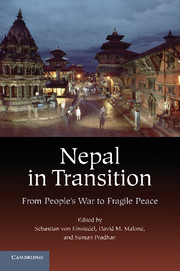Book contents
- Frontmatter
- Contents
- Contributors
- Acknowledgments
- 1 Introduction
- The Context
- Critical Transition and the Role of Outsiders
- 6 Nepal's Masala Peacemaking
- 7 A Comprehensive Peace? Lessons from Human Rights Monitoring in Nepal
- 8 The United Nations and Support to Nepal's Peace Process: The Role of the UN Mission in Nepal
- 9 The 2008 Constituent Assembly Election: Social Inclusion for Peace
- 10 Revolution by Other Means: The Transformation of Nepal's Maoists in a Time of Peace
- Regional Dynamics
- Conclusions
- Index
- References
6 - Nepal's Masala Peacemaking
Published online by Cambridge University Press: 05 April 2012
- Frontmatter
- Contents
- Contributors
- Acknowledgments
- 1 Introduction
- The Context
- Critical Transition and the Role of Outsiders
- 6 Nepal's Masala Peacemaking
- 7 A Comprehensive Peace? Lessons from Human Rights Monitoring in Nepal
- 8 The United Nations and Support to Nepal's Peace Process: The Role of the UN Mission in Nepal
- 9 The 2008 Constituent Assembly Election: Social Inclusion for Peace
- 10 Revolution by Other Means: The Transformation of Nepal's Maoists in a Time of Peace
- Regional Dynamics
- Conclusions
- Index
- References
Summary
Nepal's peace process was both led and driven by Nepalis, but it was also remarkably open to the involvement of a wide range of external actors. This chapter focuses on the most prominent and committed of the international peacemakers involved – among them the Swiss-based nongovernmental organization (NGO), the Centre for Humanitarian Dialogue, that worked in Nepal from 2000–6; the United Nations, whose secretary-general first offered his “good offices” in 2002 and whose presence later grew into a large Office of the UN High Commissioner for Human Rights (OHCHR, established in 2005) and a special political mission, the United Nations Mission in Nepal (UNMIN, formed in 2007); the Carter Center, whose conflict resolution program engaged with Nepal from 2004–6; and the government of Switzerland, which dispatched a special adviser for peacebuilding to Nepal in mid-2005. The chapter also analyzes the critical role played by India, which is explored more fully elsewhere in this volume.
None of these external actors came to fill a role of formal facilitation or still less mediation. For the most part, their efforts to encourage dialogue, introduce expertise gleaned from peace processes elsewhere, or provide other unspecified support were undertaken on an entrepreneurial basis, rather than in response to a clear invitation. These activities paralleled not only the presence and activity of national facilitators but also the discrete efforts of a number of individuals within Nepali civil society who encouraged dialogue between Nepal's fractious political actors. These varied actors at times appeared to crowd the peacemaking field in a confusing fashion, yet they were able to make a number of significant contributions. The result was a unique peacemaking mix – masala peacemaking.
- Type
- Chapter
- Information
- Nepal in TransitionFrom People's War to Fragile Peace, pp. 155 - 174Publisher: Cambridge University PressPrint publication year: 2012
References
- 6
- Cited by



